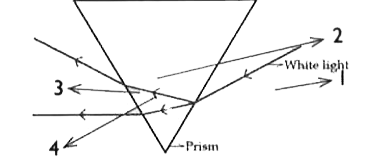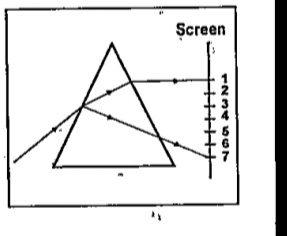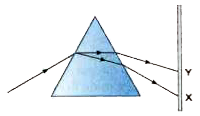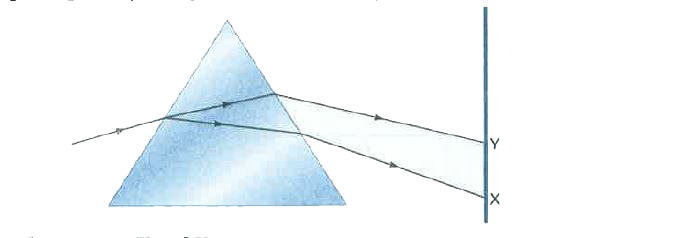When a beam of white light is passed through a triangular glass prism, it gets dispersed into its seven colour components. Why do we get these colours ? In the given figure, the colours 3 and 4 represent the extreme components of the spectrum. Identify 3 and 4.
 Solution in Kannada
Solution in Kannada
(i) Different colours of light travel with different speeds while passing through a prism. Hence, they are bent at different angles with respect to the incident ray. This leads to the dispersion of light.
(ii) X = violet, Y = red.
Similar Questions
When a beam of white light is passed through a triangular glass prism, it gets dispersed into its component colours. Why do we get these colours ? In the given figure, the colours X and Y represent the extreme components of the spectrum. Identify X and Y.
View SolutionWhy do the seven-colour components of white light bend through different an with respect to the incident beam of light after passing' through a prism?
View SolutionA narrow beam of white light passes through a triangular glass prism and gets split up into seven colours marked 1 to 7. Which two positions correspond closely to the colour of: potassium permanganate?
View SolutionA narrow beam of white light passes through a triangular glass prism and gets split up into seven colours marked 1 to 7.
Which two positions correspond closely to the colour of:
'danger' or 'stop signal lights'?
View SolutionWhen a beam of white light passes through a triangular glass prism, it splits up into its component colours. It is due to ...........
View SolutionPass sunlight through a triangular shaped glass prism and' it gets split up into component colours. a) What are different component colours? b) Is it the sunlight alone that gets split up into component colours? If not name another light which also gets split up. c) Write the common name of this kind of light.
View SolutionIn the given figure, a narrow beam of white light is shown to pass through a triangular glass prism. After passing through the prism it produces a spectrum XY on a screen.
(a) State the colour seen at X and Y.
(b) Why do different colours of white light bend through different angles with respect to the incident beam of light?

View SolutionIn the given figure, a narrow beam of white light is shown to pass through a triangular glass prism. After passing through the prism it produces a spectrum XY on a screen.

(a) State the colour seen at X and Y.
(b) Why do different colours of white light bend through different angles with respect to the incident beam of light?
View Solution